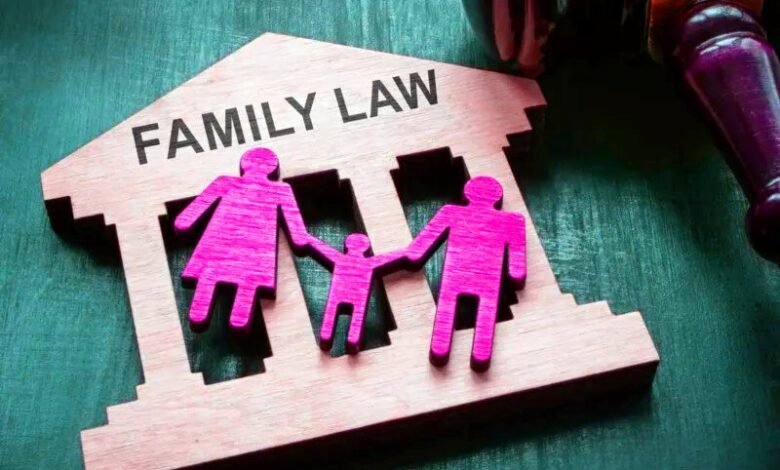Family Law Essentials: A Comprehensive Handbook

Family law is a branch of legal practice that deals with matters relating to family and domestic relations. It encompasses a wide range of issues, including marriage, divorce, child custody, adoption, domestic violence, and paternity. Understanding family law is crucial for individuals and families facing legal challenges or seeking to protect their rights and interests.
Types of Family Law Cases
Divorce and Dissolution of Marriage
Divorce is the legal process of ending a marriage or marital union. It involves various issues such as division of property, spousal support, child custody, and visitation rights. Dissolution of marriage refers to the termination of a marital relationship through legal means.
Child Custody and Support
Child custody and support are central issues in family law cases involving children. Custody arrangements determine where the child will live and how decisions regarding the child’s upbringing will be made. Child support involves financial assistance provided by one parent to the other for the care and upbringing of the child.
Adoption
Adoption is the legal process of establishing a parent-child relationship between individuals who are not biologically related. It involves terminating the parental rights of the biological parents and granting parental rights to the adoptive parents.
Domestic Violence and Protective Orders
Domestic violence refers to abusive behavior used by one person to control another in a domestic or intimate relationship. Protective orders, also known as restraining orders, are legal orders issued by a court to protect victims of domestic violence from further harm.
Paternity and Parentage
Paternity and parentage cases involve establishing the legal father-child relationship. This may be necessary for purposes of child support, inheritance rights, and parental responsibilities.
Understanding Divorce
Grounds for Divorce
Grounds for divorce vary depending on the jurisdiction but commonly include irreconcilable differences, adultery, abandonment, and cruelty.
Divorce Process and Legal Requirements
The divorce process typically involves filing a petition, serving the other party, negotiation or mediation, court hearings, and the finalization of the divorce decree.
Division of Assets and Debts
The division of assets and debts in divorce involves determining how marital property will be divided equitably between the spouses.
Child Custody and Support
Types of Custody Arrangements
Custody arrangements may be joint or sole, with physical and legal custody determining where the child lives and who makes decisions regarding the child’s upbringing.
Factors Considered in Custody Determination
Courts consider various factors when determining custody, including the child’s best interests, parental fitness, and the child’s relationship with each parent.
Child Support Guidelines and Calculations
Child support guidelines vary by state but generally consider factors such as each parent’s income, the child’s needs, and the cost of childcare and health insurance.
Adoption Process
Types of Adoption
Adoptions may be domestic or international, agency-assisted or independent, and involve various legal procedures and requirements.
Legal Procedures for Adoption
The adoption process typically includes home studies, background checks, consent of birth parents, and finalization of the adoption through court proceedings.
Rights and Responsibilities of Adoptive Parents
Adoptive parents have the same rights and responsibilities as biological parents, including financial support, decision-making authority, and parental obligations.
Read More: Ethical Dilemmas in Healthcare Law: Balancing Patient Care and Legal Obligations
Domestic Violence Laws
Definition of Domestic Violence
Domestic violence encompasses physical, emotional, sexual, and financial abuse within intimate relationships, including marriages, dating relationships, and cohabitation.
Protective Orders and Restraining Orders
Protective orders are legal remedies available to victims of domestic violence to prevent further abuse, harassment, or contact by the abuser.
Legal Recourse for Victims
Victims of domestic violence have legal recourse through civil and criminal proceedings, including obtaining protective orders, filing criminal charges, and seeking damages in civil court.
Paternity and Parentage
Establishing Paternity
Paternity may be established through voluntary acknowledgment, genetic testing, or court proceedings to determine parental rights and responsibilities.
Rights and Obligations of Unmarried Parents
Unmarried parents have rights and obligations regarding custody, visitation, and child support, even if paternity has not been formally established.
Parentage Disputes and Resolutions
Parentage disputes may arise regarding custody, support, or inheritance rights, which can be resolved through mediation, negotiation, or court intervention.
Legal Representation in Family Law Matters
Importance of Hiring a Family Law Attorney
Family law matters can be complex and emotionally challenging, requiring the expertise of a qualified attorney to navigate the legal process and protect one’s rights.
Role of Legal Aid and Pro Bono Services
Legal aid organizations and pro bono attorneys provide free or low-cost legal assistance to individuals who cannot afford private representation in family law cases.
Mediation and Alternative Dispute Resolution
Benefits of Mediation
Mediation offers a collaborative and confidential process for resolving family law disputes outside of court, allowing parties to maintain control over the outcome.
Collaborative Law Approach
Collaborative law involves voluntary participation by both parties and their attorneys to reach mutually acceptable agreements without litigation.
Arbitration in Family Law Cases
Arbitration provides a private and expedited alternative to traditional court proceedings, with a neutral arbitrator making binding decisions on contested issues.
Financial Considerations in Family Law
Alimony and Spousal Support
Alimony, also known as spousal support or maintenance, is financial assistance provided by one spouse to the other following divorce to maintain their standard of living.
Property Division
Property division involves the equitable distribution of marital assets and debts, including real estate, investments, retirement accounts, and personal property.
Tax Implications of Family Law Matters
Family law matters such as alimony, child support, and property transfers may have tax implications for both parties, requiring careful consideration and planning.
Child Protection and Welfare
Role of Child Protective Services
Child Protective Services (CPS) investigates allegations of child abuse or neglect and intervenes to ensure the safety and well-being of children in at-risk situations.
Legal Standards for Child Welfare
Courts apply legal standards such as the best interests of the child when making decisions regarding custody, visitation, and parental rights in child welfare cases.
Termination of Parental Rights
Termination of parental rights may occur in cases of abuse, neglect, or abandonment, to protect the child’s safety and welfare.
International Family Law Issues
Cross-Border Custody Disputes
Cross-border custody disputes involve conflicts over jurisdiction, enforcement of court orders, and international child abduction cases under the Hague Convention.
Hague Convention on International Child Abduction
The Hague Convention establishes procedures for the prompt return of children abducted across international borders by a parent or guardian.
Jurisdictional Challenges
Jurisdictional challenges arise in international family law cases regarding custody, divorce, and enforcement of court orders across different countries’ legal systems.
LGBTQ+ Family Law Issues
Same-Sex Marriage and Divorce
Legal recognition of same-sex marriage and divorce varies by jurisdiction, with LGBTQ+ couples facing unique legal challenges in family law matters.
Adoption by LGBTQ+ Couples
Adoption laws for LGBTQ+ couples vary by state and country, with some jurisdictions allowing joint adoption by same-sex couples and others imposing restrictions.
Legal Protections for LGBTQ+ Families
Legal protections for LGBTQ+ families include anti-discrimination laws, recognition of parental rights, and access to family law remedies such as adoption and custody.
Recent Developments in Family Law
Legal Trends and Changes
Recent developments in family law include legislative reforms, court decisions, and societal shifts impacting marriage, divorce, and parental rights.
Impact of Technology on Family Law
Advances in technology have influenced family law practice, including electronic filing, virtual court hearings, and digital evidence in divorce and custody cases.
Read More: How to Keep Your Family Safe: Know Your Legal Rights and Duties
Conclusion
Family law encompasses a wide range of legal issues affecting individuals and families, from marriage and divorce to child custody, adoption, and domestic violence. Understanding family law essentials is crucial for navigating legal challenges, protecting rights, and ensuring the well-being of family members. Seeking legal advice and assistance from qualified professionals can help individuals achieve fair and favorable outcomes in family law matters.
FAQs
What is the role of a family law attorney?
A family law attorney provides legal representation and guidance to individuals facing family-related legal issues, including divorce, custody disputes, and domestic violence matters.
How are child custody decisions made in family law cases?
Child custody decisions are based on the best interests of the child, considering factors such as parental fitness, the child’s relationship with each parent, and the child’s preferences depending on age and maturity.
What are the different types of adoption?
Adoption can be domestic or international, agency-assisted or independent, and may involve various legal procedures and requirements depending on the jurisdiction and circumstances of the adoption.
How does mediation work in family law disputes?
Mediation is a voluntary and confidential process where parties work with a neutral mediator to reach mutually acceptable agreements on issues such as custody, support, and property division outside of court.
What are the tax implications of divorce and spousal support?
Divorce and spousal support payments may have tax implications for both parties, including deductions for alimony payments and tax consequences of property transfers, requiring careful planning and consideration.











